牛津译林版(2019)选择性必修第一册Unit 3The art of painting Section B Grammar and usage 课件(17张ppt))
文档属性
| 名称 | 牛津译林版(2019)选择性必修第一册Unit 3The art of painting Section B Grammar and usage 课件(17张ppt)) | 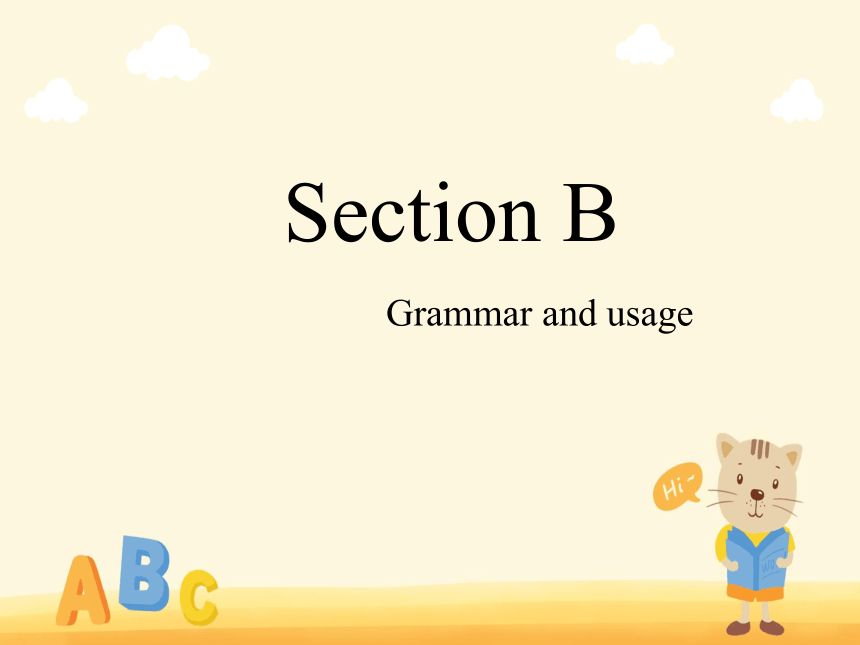 | |
| 格式 | pptx | ||
| 文件大小 | 2.2MB | ||
| 资源类型 | 教案 | ||
| 版本资源 | 牛津译林版(2019) | ||
| 科目 | 英语 | ||
| 更新时间 | 2022-10-06 16:17:30 | ||
图片预览

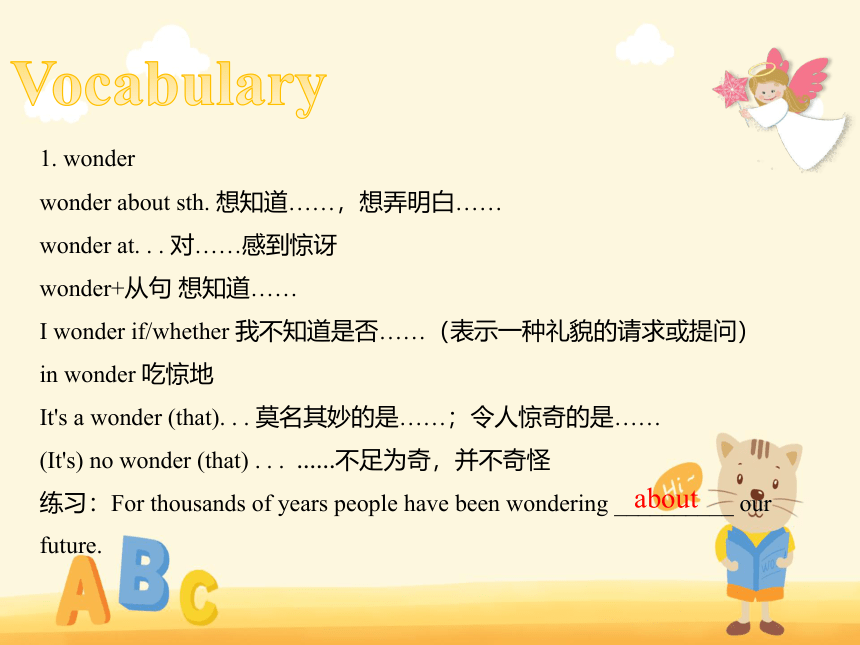
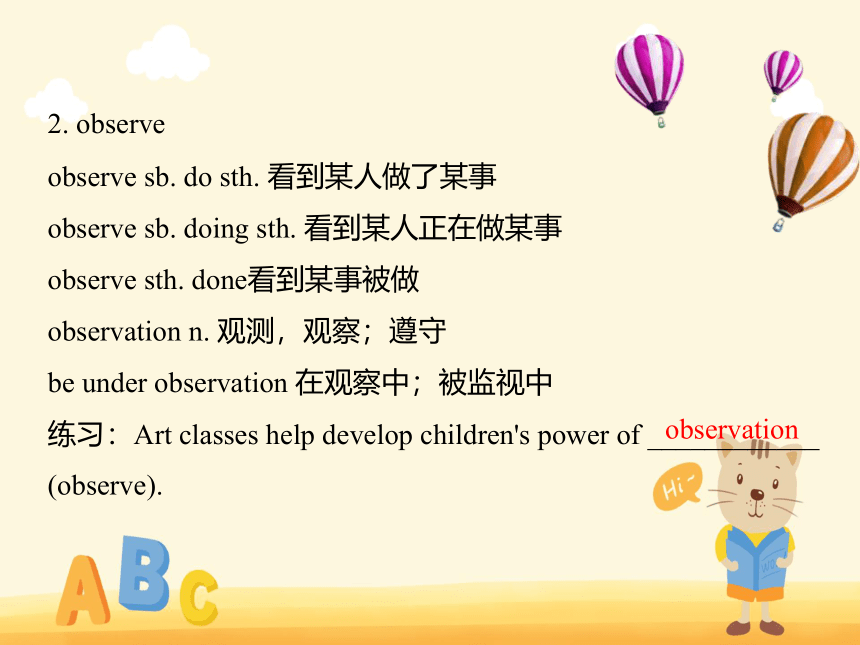
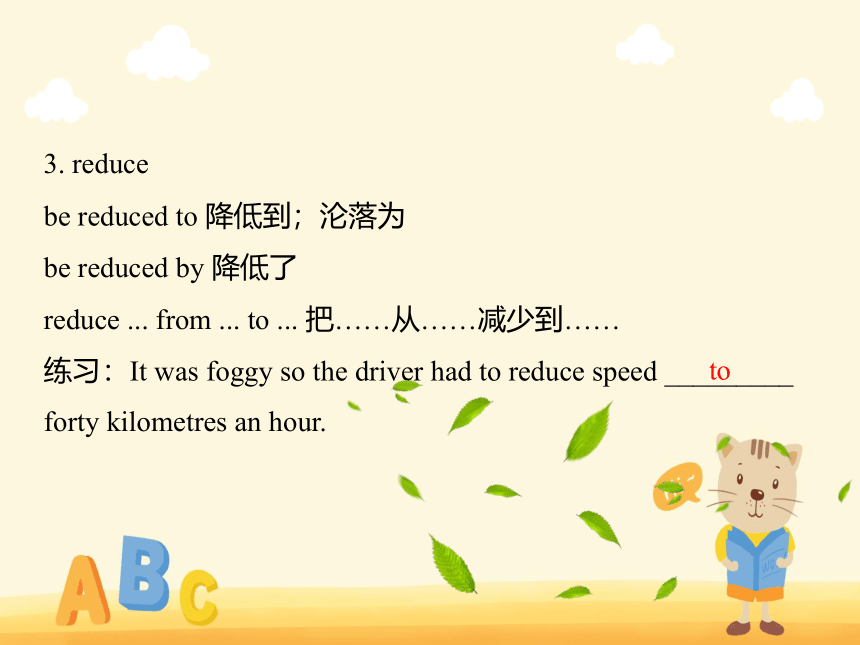

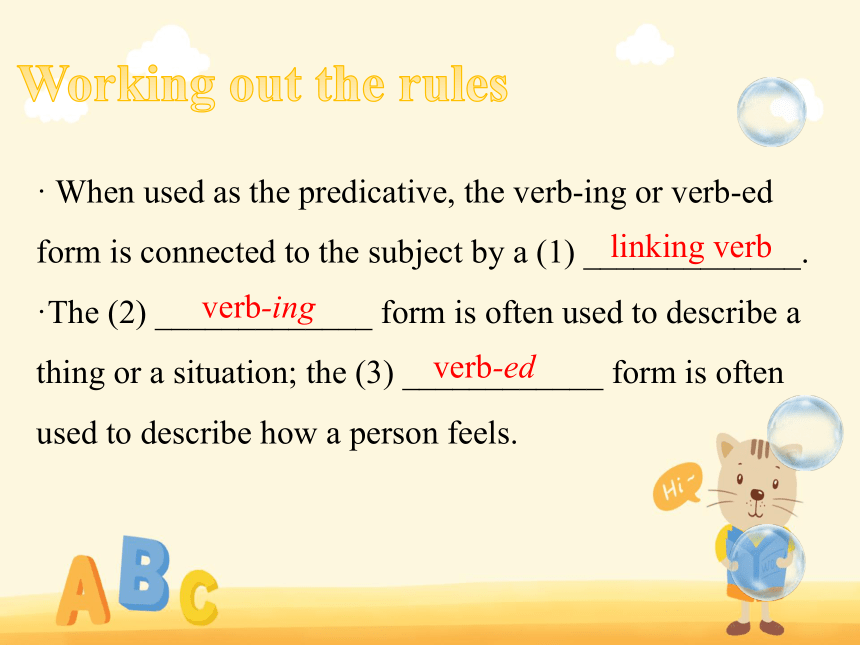
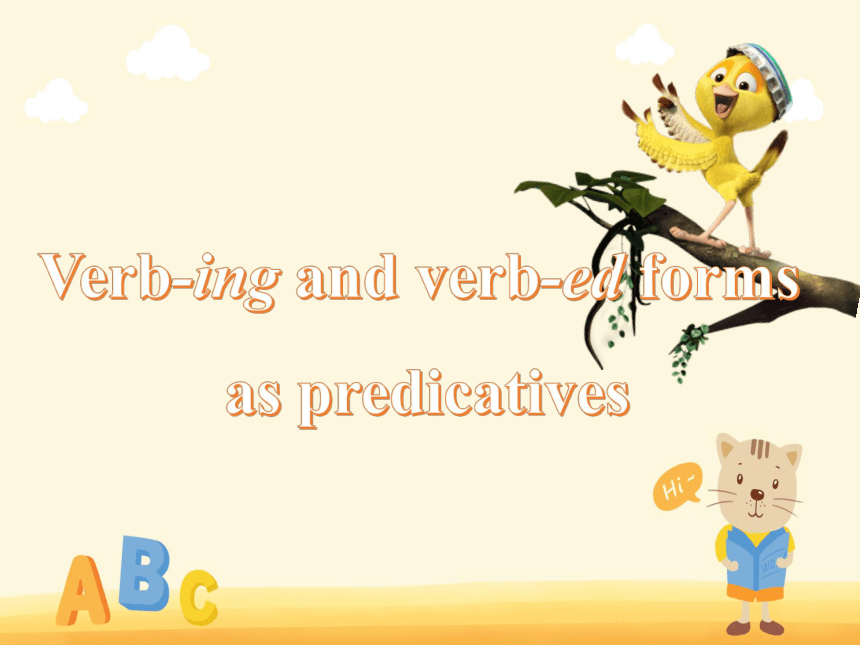
文档简介
(共17张PPT)
Section B
Grammar and usage
Vocabulary
1. wonder
wonder about sth. 想知道……,想弄明白……
wonder at. . . 对……感到惊讶
wonder+从句 想知道……
I wonder if/whether 我不知道是否……(表示一种礼貌的请求或提问)
in wonder 吃惊地
It's a wonder (that). . . 莫名其妙的是……;令人惊奇的是……
(It's) no wonder (that) . . . ……不足为奇,并不奇怪
练习:For thousands of years people have been wondering __________ our future.
about
2. observe
observe sb. do sth. 看到某人做了某事
observe sb. doing sth. 看到某人正在做某事
observe sth. done看到某事被做
observation n. 观测,观察;遵守
be under observation 在观察中;被监视中
练习:Art classes help develop children's power of ____________ (observe).
observation
3. reduce
be reduced to 降低到;沦落为
be reduced by 降低了
reduce ... from ... to ... 把……从……减少到……
练习:It was foggy so the driver had to reduce speed _________ forty kilometres an hour.
to
Leading in
As I wandered in the National Gallery, I was amazed to see all the paintings.
I wondered at the skill of the artists, their use of colour and how they played with light and shade. I observed the brushwork they used to enhance their works.
I enjoyed the whole experience-to be able to bathe my senses in this palace of human creativity. It was surprising then to see so many people viewing important and precious artworks through their smartphones. It might sound shocking, but they seemed more interested in taking photos and recording videos of artworks than appreciating them with their own eyes. How was it possible, I wondered, to truly appreciate the human touch of a great painting when it was reduced to a few million pixels Looking at artworks through smartphones, I thought, was like trying to appreciate the countryside without being able to hear the birds sing, feel the breeze against my face or smell the flowers. Moving slowly through the National Gallery, I was determined to keep my smartphone in my bag and appreciate each individual painting with the best camera in the world: my own eyes.
Working out the rules
· When used as the predicative, the verb-ing or verb-ed form is connected to the subject by a (1) _____________.
·The (2) _____________ form is often used to describe a thing or a situation; the (3) ____________ form is often used to describe how a person feels.
linking verb
verb-ing
verb-ed
Verb-ing and verb-ed forms
as predicatives
动词-ing 形式作表语
动词-ing形式做表语可以用来表示主语的特性、状态、情感等,具有形容词的特征。
Your achievements are very inspiring. 你的成就很鼓舞人心。
His work is very interesting. 他的工作很有趣。
注意:
动词-ing形式做表语,常见的有:exciting,interesting,disappointing,discouraging,encouraging,puzzling,missing,surprising,confusing,amusing,charming,astonishing,shocking,inviting等。这些动词-ing形式几乎已经变成了形容词,可以用very修饰。
易混用法 区别 例句
动名词作表语 解释说明主语的内容,主语和表语可以互换 My hobby is playing chess. 我的业余爱好是下棋。
动词-ing作表语 说明主语的性质、特征、状态等,主语和表语不可以互换 The argument is very convincing.
这一论据很有说服力。
动词-ed形式作表语
(1)动词-ed形式做表语,多表示主语所处的状态或所具备的特征,多位于系动词之后。这些系动词有be,remain,feel,seem,look,become等。
(2)有些动词-ed形式做表语时,已经具有了形容词的性质,最常见的有:amazed,delighted,disappointed,discouraged,amused,astonished,lost,crowded,tired,satisfied,pleased,surprised,worried,excited,married,puzzled,upset等。
Later they found that they were lost. 后来他们发现他们迷路了。
We were amazed at the beauty of the lake. 这个湖泊的美使我们感到惊奇。
She was disappointed at the news. 她对这个消息感到失望。
(3)动词-ed形式做表语与被动语态相似,区别在于动词-ed形式做表语表示的是一种状态或特征,而被动语态表示的是一个动作,被动意味很强,后面常跟by短语。比较下面两个句子:
This shop is now closed.
这家商店现在已经关门了。(状态)
This shop is closed at 6 pm every day.
这家商店每天下午6点关门。(动作)
动词-ed形式与动词-ing形式做表语
英语中有很多与感觉有关的及物动词,其动词-ing形式表示主动意义,即“令人……的”,多用来修饰物;其动词-ed形式含有被动意义,即“人感到……的”,多用来指人、人的声音或表情等。常见的这类词有:
exciting 令人激动的 excited 激动的,兴奋的
surprising 令人惊讶的 surprised 感到惊讶的
encouraging 令人鼓舞的 encouraged受到鼓舞的
frightening 使惊恐的 frightened 受惊的
interesting 令人感兴趣的 interested 感兴趣的
pleasing令人高兴的 pleased 满意的
moving 令人感动的 moved 受感动的
shocking 令人震惊的 shocked 感到震惊的
worrying 令人担心的 worried 感到担心的
tiring 令人劳累的 tired 感到劳累的
satisfying 令人满意的 satisfied 满意的
puzzling 令人迷惑的 puzzled 感到迷惑的
练习
1. The story was so __________ that he was ________ to tears. (move)
2. What he has done is really ______________. Now his parents are ___________ in him. (disappoint)
3. Everyone was __________ by his __________ progress which he made during the two months. (surprise)
4. The teacher must be ___________ with our performance in the experiment, which can be seen from the __________ expression on his face. (satisfy)
moving
moved
disappointing
disappointed
surprised
surprising
satisfied
satisfied
5. Having never met with such a __________ problem, he felt __________ and didn't know how to solve it. (puzzle)
6. As is known to us all, traveling is ____________ (interest), but we often feel _________ (tire) when we are back from travels.
7. Nancy was away in Paris for over a month. When she got home, she was __________ (shock) to see a pile of mail waiting for her.
8. Parents were __________ (please) with the performance of Cathy in the exam.
9. On hearing the ___________ (worry) news, my mom couldn't move her feet.
10. This month's unemployment figures are not very ____________ (encourage).
puzzling
puzzled
interesting
tired
shocked
pleased
worrying
encouraging
Thank you
Section B
Grammar and usage
Vocabulary
1. wonder
wonder about sth. 想知道……,想弄明白……
wonder at. . . 对……感到惊讶
wonder+从句 想知道……
I wonder if/whether 我不知道是否……(表示一种礼貌的请求或提问)
in wonder 吃惊地
It's a wonder (that). . . 莫名其妙的是……;令人惊奇的是……
(It's) no wonder (that) . . . ……不足为奇,并不奇怪
练习:For thousands of years people have been wondering __________ our future.
about
2. observe
observe sb. do sth. 看到某人做了某事
observe sb. doing sth. 看到某人正在做某事
observe sth. done看到某事被做
observation n. 观测,观察;遵守
be under observation 在观察中;被监视中
练习:Art classes help develop children's power of ____________ (observe).
observation
3. reduce
be reduced to 降低到;沦落为
be reduced by 降低了
reduce ... from ... to ... 把……从……减少到……
练习:It was foggy so the driver had to reduce speed _________ forty kilometres an hour.
to
Leading in
As I wandered in the National Gallery, I was amazed to see all the paintings.
I wondered at the skill of the artists, their use of colour and how they played with light and shade. I observed the brushwork they used to enhance their works.
I enjoyed the whole experience-to be able to bathe my senses in this palace of human creativity. It was surprising then to see so many people viewing important and precious artworks through their smartphones. It might sound shocking, but they seemed more interested in taking photos and recording videos of artworks than appreciating them with their own eyes. How was it possible, I wondered, to truly appreciate the human touch of a great painting when it was reduced to a few million pixels Looking at artworks through smartphones, I thought, was like trying to appreciate the countryside without being able to hear the birds sing, feel the breeze against my face or smell the flowers. Moving slowly through the National Gallery, I was determined to keep my smartphone in my bag and appreciate each individual painting with the best camera in the world: my own eyes.
Working out the rules
· When used as the predicative, the verb-ing or verb-ed form is connected to the subject by a (1) _____________.
·The (2) _____________ form is often used to describe a thing or a situation; the (3) ____________ form is often used to describe how a person feels.
linking verb
verb-ing
verb-ed
Verb-ing and verb-ed forms
as predicatives
动词-ing 形式作表语
动词-ing形式做表语可以用来表示主语的特性、状态、情感等,具有形容词的特征。
Your achievements are very inspiring. 你的成就很鼓舞人心。
His work is very interesting. 他的工作很有趣。
注意:
动词-ing形式做表语,常见的有:exciting,interesting,disappointing,discouraging,encouraging,puzzling,missing,surprising,confusing,amusing,charming,astonishing,shocking,inviting等。这些动词-ing形式几乎已经变成了形容词,可以用very修饰。
易混用法 区别 例句
动名词作表语 解释说明主语的内容,主语和表语可以互换 My hobby is playing chess. 我的业余爱好是下棋。
动词-ing作表语 说明主语的性质、特征、状态等,主语和表语不可以互换 The argument is very convincing.
这一论据很有说服力。
动词-ed形式作表语
(1)动词-ed形式做表语,多表示主语所处的状态或所具备的特征,多位于系动词之后。这些系动词有be,remain,feel,seem,look,become等。
(2)有些动词-ed形式做表语时,已经具有了形容词的性质,最常见的有:amazed,delighted,disappointed,discouraged,amused,astonished,lost,crowded,tired,satisfied,pleased,surprised,worried,excited,married,puzzled,upset等。
Later they found that they were lost. 后来他们发现他们迷路了。
We were amazed at the beauty of the lake. 这个湖泊的美使我们感到惊奇。
She was disappointed at the news. 她对这个消息感到失望。
(3)动词-ed形式做表语与被动语态相似,区别在于动词-ed形式做表语表示的是一种状态或特征,而被动语态表示的是一个动作,被动意味很强,后面常跟by短语。比较下面两个句子:
This shop is now closed.
这家商店现在已经关门了。(状态)
This shop is closed at 6 pm every day.
这家商店每天下午6点关门。(动作)
动词-ed形式与动词-ing形式做表语
英语中有很多与感觉有关的及物动词,其动词-ing形式表示主动意义,即“令人……的”,多用来修饰物;其动词-ed形式含有被动意义,即“人感到……的”,多用来指人、人的声音或表情等。常见的这类词有:
exciting 令人激动的 excited 激动的,兴奋的
surprising 令人惊讶的 surprised 感到惊讶的
encouraging 令人鼓舞的 encouraged受到鼓舞的
frightening 使惊恐的 frightened 受惊的
interesting 令人感兴趣的 interested 感兴趣的
pleasing令人高兴的 pleased 满意的
moving 令人感动的 moved 受感动的
shocking 令人震惊的 shocked 感到震惊的
worrying 令人担心的 worried 感到担心的
tiring 令人劳累的 tired 感到劳累的
satisfying 令人满意的 satisfied 满意的
puzzling 令人迷惑的 puzzled 感到迷惑的
练习
1. The story was so __________ that he was ________ to tears. (move)
2. What he has done is really ______________. Now his parents are ___________ in him. (disappoint)
3. Everyone was __________ by his __________ progress which he made during the two months. (surprise)
4. The teacher must be ___________ with our performance in the experiment, which can be seen from the __________ expression on his face. (satisfy)
moving
moved
disappointing
disappointed
surprised
surprising
satisfied
satisfied
5. Having never met with such a __________ problem, he felt __________ and didn't know how to solve it. (puzzle)
6. As is known to us all, traveling is ____________ (interest), but we often feel _________ (tire) when we are back from travels.
7. Nancy was away in Paris for over a month. When she got home, she was __________ (shock) to see a pile of mail waiting for her.
8. Parents were __________ (please) with the performance of Cathy in the exam.
9. On hearing the ___________ (worry) news, my mom couldn't move her feet.
10. This month's unemployment figures are not very ____________ (encourage).
puzzling
puzzled
interesting
tired
shocked
pleased
worrying
encouraging
Thank you
同课章节目录
- Unit 1 Food matters
- Welcome to the unit
- Reading
- Grammar and usage
- Integrated skills
- Extended reading
- Project
- Unit 2 The Universal Language
- Welcome to the unit
- Reading
- Grammar and usage
- Integrated skills
- Extended reading
- Project
- Unit 3 The art of painting
- Welcome to the unit
- Reading
- Grammar and usage
- Integrated skills
- Extended reading
- Project
- Unit 4 Exploring poetry
- Welcome to the unit
- Reading
- Grammar and usage
- Integrated skills
- Extended reading
- Project
